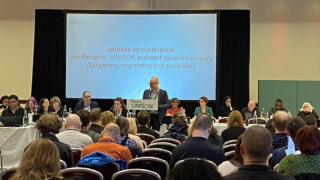UNISON pledged to oppose the government’s latest attack on public service pensions in the last session of national delegate conference in Liverpool on Friday afternoon.
The government is proposing changes would allow higher education institutions, further education colleges and sixth form colleges in England to choose not to offer pensions via the local government pension scheme (LGPS) to new staff.
Mike Hines of the national executive council moving the emergency motion declared that it was, “purely a political act and only targeting members in England,” and that it was the result of lobbying from vice chancellors and set a dangerous precedent.
Mr Hines argued that the issue wouldn’t affect just education members: “This is the thin edge of the wedge. Other employers will ask the government for similar opt-outs. This is the fight for our pension scheme as a whole.
“And we need to recognise it’s a fight for the whole union, not just one part of the union. Now is our time to make sure those that come after us are not deprived. No matter what service group you are in, this is our issue.”
Denise Ward, who chairsof national HE pension board, noted that staff at Stafford University have already taken six days of strike action on the issue and that the proposals could affect the financial viability of the scheme for future members.
“We need to nip this in the bud,’ she said. “And it will most effect women and the low paid. We must stop this spreading across all sectors.”
Andrew Langford from Northampton local government branch noted that the LGPS is the fifth largest pension scheme in the UK, with 5.8 million members, and said the proposals are “a cynical Tory attack on the LGPS”.
He argued that if the proposals were accepted, colleges and post-92 universities “will no longer be considered public service employers” and a two-tier workforce will be created with new starters “being offered inferior and less cost effective schemes”.
Other speakers noted that the proposals were an attack on the pension rights of working people delivering public services and that while initial figures suggested approximately 3% of LGPS membership was at risk, this could grow to 20% of potential membership if later extended to all admitted and scheduled bodies.
Conference agreed that if not challenged, the proposals would discriminate against support staff, particularly women and the low paid, and will lead to many retiring into poverty with a cost to the individual and state in the form of additional benefit payments.
Earlier story: UNISON issues pension warning for university and college workers (05 June 2019)









